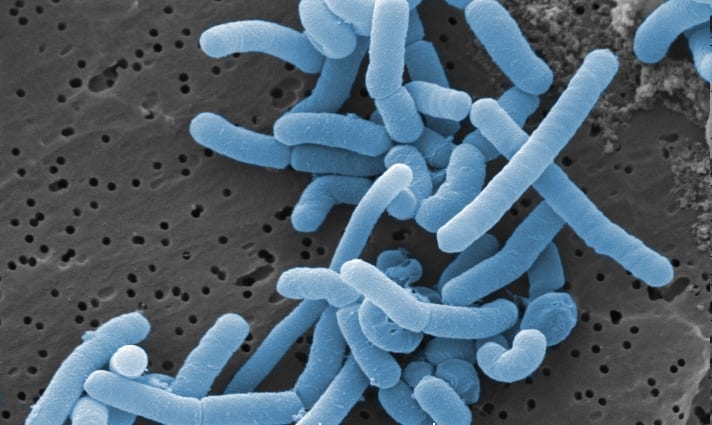In the Bible, second chapter of Genesis verse seven, we are informed that God formed man “from the dust of the ground,” which may have a more literal interpretation than many of us think. Within this dust of the Earth is a host of microbes containing genetic material that influence human health and disease. Both inside and outside the human body, resides an enormous collection of microbes—bacteria, archaebacteria, fungi, and viruses. Throughout the centuries, humans have formed a vital and symbiotic relationship with these microbes that has shaped human biology and behavior.
Collectively called the microbiome or microbiota, these microbes in and on the human body and the genes they contain outnumber our own human cells, making us microbial beings. Research suggests that bacterial microbes alone outnumber human cells about 1.3 to 1, and this doesn’t even consider the fungi and viruses present in and on our body.
Healthy early-life developmental is contingent on the development of a diverse and healthy microbiota, which is influenced by mode of delivery (vaginal or C-section), your mother’s microbiota, gestational age, infant feeding method (breastfeeding or formula), and other genetic and environmental factors according to research. From birth, microbes populate an infant’s body with microbial diversity increasing rapidly during the first month of life. Interestingly, mother’s breast milk adapts to provide the right polysaccharides to feed an infant’s growing microbiota population.
The human microbiota continues to develop, adapt, and change throughout childhood, adolescence, and adulthood. To maintain health, humans must maintain a broad diversity of organisms and provide an environment where friendly microbes can thrive and the overgrowth of harmful microbes is kept in check.
With so many microbes present in and on our body, they obviously play a critical role in human health. Indeed, these microbes are extremely important to an array of body functions including hormone production, metabolism, neurotransmitter production and brain communication, immune system activity, mood, and virtually all aspects of human health. It wouldn’t be an exaggeration to state that human health is reliant on continual exposure to, replenishment of, and connection with microbes.
Unfortunately, modern society has deliberately and inadvertently interfered with our relationship with microbes. The vast majority of the world’s population lives in cities and urban areas where most of our time is spent indoors leading to a significant decrease in our exposure to microbes—a major factor in rapidly declining microbiota diversity. Constant wearing of footwear limits our exposure to the microbiota in the soil that our ancestors enjoyed with bare feet and sandals. Widespread use of pesticides and herbicides compromises microbiome health by destroying massive swaths of friendly microbes. And the overuse of antibiotics and antimicrobial cleaning products to cleanse every single surface alters the microbiome leading to dysregulation of key bodily functions and an increased risk of disease. We may be literally altering human health in the modern age by disrupting a centuries-old mutually beneficial relationship with our microbiota.
A renaissance and revival of our connection with these microbes is vital to human health. Here are seven tips to maintain a healthy and diverse microbiota.
- Consume fermented foods and beverages. Consumed by humans for centuries, fermented foods and beverages employ an ancient food preservation technique whereby the food or beverage undergoes a controlled fermentation process. Bacteria or yeast breakdown carbs—sugars and starches—to ferment the food or beverage, thus altering its flavor and shelf-life. Common fermented foods and beverages include yogurt, kefir, cider, sourdough bread, sauerkraut, kombucha, kimchi, and miso. These foods are beneficial because they provide a variety of probiotics to encourage microbiome diversity.
- Eat lots of fiber from vegetables, legumes, beans, and fruit. Just like you, bacterial microbes require nutrition to stay viable. One source of nutrition for probiotics is fiber. Fiber can be digested by certain bacteria in the gut, which stimulates their growth and favorably alters the microbiome according to research.
- Reduce added sugar and unhealthy fats in your diet. This one is common sense for general health, but sugar and unhealthy fats (trans and saturated) also negatively impact your microbiome. Studies in animals show that high-fat or high-sugar consumption contributes to dysbiosis—imbalance in the gut microbial community that increases disease risk—and can increase brain inflammation and decrease brain function.
- Manage stress. Psychological stress affects virtually all aspects of human health. Your emotional and cognitive centers of the brain are linked to intestinal functions through a connection called the gut-brain axis (GBA). The GBA serves as a two-way communication link between the central and enteric nervous systems. Simply put, the vagus nerve is like a telephone wire that connects the phone in the gut to the phone in the brain so the two organs can efficiently communicate. The breakdown of food by gut bacteria produces metabolites (short chain fatty acids) in the intestinal tract that are sensed by the vagus nerve—the longest and most complex of the 12 pairs of cranial nerves. In response to these intestinal metabolites, the vagus nerve delivers information to the brain. The vagus nerve is important for breathing, cardiovascular function, and inflammation control. Unfortunately, stress disrupts vagus nerve function, preventing it from performing these important tasks.
- Walk barefoot in the dirt. Don’t forget your skin microbiota. Walking barefoot allows direct contact with the soil, which has a positive effect on your mind and body. As you slowly stroll along the soil or grass with bare feet you absorb some of the microbes in the ground. Even short-term direct contact with soil and plant materials can cause an immediate increase in beneficial microbes on your skin according to scientists. One study found that contact with microbes in the soil can make you feel happier. Researchers believe that soil microbes can influence immune cell activity and their release of cytokines that regulate our inflammatory response as well.
- Reduce use of antimicrobial cleaners and only use antibiotics when absolutely necessary. This is pretty self-explanatory. Antimicrobial cleaners kill both beneficial and potentially pathogenic organisms and their overuse is suspected of contributing to antibiotic resistance. It isn’t necessary to excessively wipe every surface you may touch with an antimicrobial cleaner. In addition, several studies have demonstrated that antibiotics can result in dysbiosis, and this disruption of the gut microbiome contributes to numerous diseases, including diabetes, obesity, inflammatory bowel disease, asthma, rheumatoid arthritis, depression, and autism.
- Take probiotics supplements. To maintain a healthy and diverse microbiome, it is helpful to take probiotic supplements. Look for a probiotic supplement with numbered strains listed on the bottle. These numbers are essential to ensure the correct probiotic strain is used for therapeutic benefits and clinical efficacy. For example, Lactobacillus plantarum 299v has been shown to effectively reduce IBS symptoms, whereas administration of L. plantarum MF1298 can make IBS symptoms worse. It is a good idea to rotate the probiotic you are taking to include different strains so that you maintain microbiome diversity.


I really enjoyed reading this. Thank you.
Thank you for sharing this wonderful information. I always feel like a sponge reading your stuff.
Comments are closed.